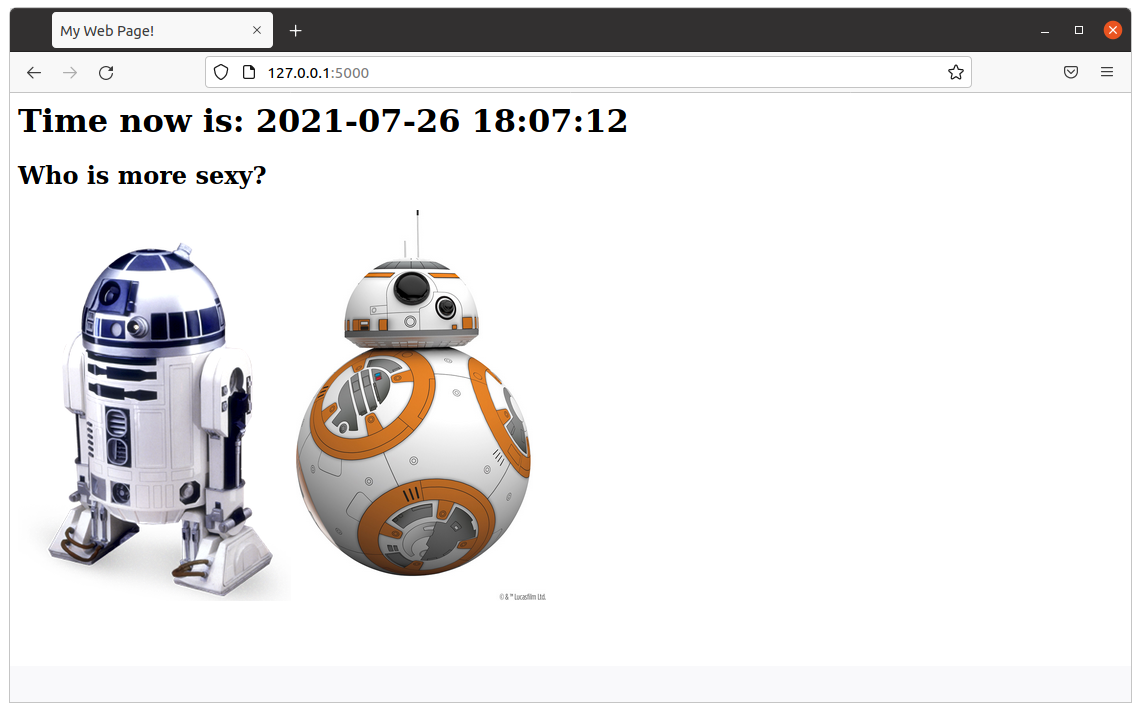A sample Flask application

Today I bring you a game made with Python and Flask extracted from my book Python 3 Combat Guide.
It is a very simple game where you have to choose what Star wars robot you prefer.
Then an internal counter, kept in a static variable, is updated.
I display the time as well, to show the use of a in import and dynamic contents printed as well.
I added a Dockerfile and a bash script to build the Docker Image, so you can run the Docker Container without installing anything in your computer.
You can download the code from here:
https://gitlab.com/carles.mateo/python-flask-r2d2
Or clone the project:
git clone https://gitlab.com/carles.mateo/python-flask-r2d2.gitThen build the image with the script I provided:
sudo ./build_docker.sh After Docker Image flask_app is built, you can run a Docker Container based on it with:
sudo docker run -d -p 5000:5000 --name flask_app flask_appAfter you’re done, in order to stop the Container type:
sudo docker stop flask_appHere is the source code of the Python file flask_app.py:
#
# flask_app.py
#
# Author: Carles Mateo
# Creation Date: 2020-05-10 20:50 GMT+1
# Description: A simple Flask Web Application
# Part of the samples of https://leanpub.com/pythoncombatguide
# More source code for the book at https://gitlab.com/carles.mateo/python_combat_guide
#
from flask import Flask
import datetime
def get_datetime(b_milliseconds=False):
"""
Return the datetime with miliseconds in format YYYY-MM-DD HH:MM:SS.xxxxx
or without milliseconds as YYYY-MM-DD HH:MM:SS
"""
if b_milliseconds is True:
s_now = str(datetime.datetime.now())
else:
s_now = str(datetime.datetime.now().strftime("%Y-%m-%d %H:%M:%S"))
return s_now
app = Flask(__name__)
# Those variables will keep their value as long as Flask is running
i_votes_r2d2 = 0
i_votes_bb8 = 0
@app.route('/')
def page_root():
s_page = "<html>"
s_page += "<title>My Web Page!</title>"
s_page += "<body>"
s_page += "<h1>Time now is: " + get_datetime() + "</h1>"
s_page += """<h2>Who is more sexy?</h2>
<a href="r2d2"><img src="static/r2d2.png"></a> <a href="bb8"><img width="250" src="static/bb8.jpg"></a>"""
s_page += "</body>"
s_page += "</html>"
return s_page
@app.route('/bb8')
def page_bb8():
global i_votes_bb8
i_votes_bb8 = i_votes_bb8 + 1
s_page = "<html>"
s_page += "<title>My Web Page!</title>"
s_page += "<body>"
s_page += "<h1>Time now is: " + get_datetime() + "</h1>"
s_page += """<h2>BB8 Is more sexy!</h2>
<img width="250" src="static/bb8.jpg">"""
s_page += "<p>I have: " + str(i_votes_bb8) + "</p>"
s_page += "</body>"
s_page += "</html>"
return s_page
@app.route('/r2d2')
def page_r2d2():
global i_votes_r2d2
i_votes_r2d2 = i_votes_r2d2 + 1
s_page = "<html>"
s_page += "<title>My Web Page!</title>"
s_page += "<body>"
s_page += "<h1>Time now is: " + get_datetime() + "</h1>"
s_page += """<h2>R2D2 Is more sexy!</h2>
<img src="static/r2d2.png">"""
s_page += "<p>I have: " + str(i_votes_r2d2) + "</p>"
s_page += "</body>"
s_page += "</html>"
return s_page
if __name__ == "__main__":
app.run(host="0.0.0.0", port=5000, debug=True)
As always, the naming of the variables is based on MT Notation.
The Dockerfile is very straightforward:
FROM ubuntu:20.04
MAINTAINER Carles Mateo
ARG DEBIAN_FRONTEND=noninteractive
RUN apt update && \
apt install -y vim python3-pip && pip3 install pytest && \
apt-get clean
ENV PYTHON_COMBAT_GUIDE /var/python_combat_guide
RUN mkdir -p $PYTHON_COMBAT_GUIDE
COPY ./ $PYTHON_COMBAT_GUIDE
ENV PYTHONPATH "${PYTHONPATH}:$PYTHON_COMBAT_GUIDE/src/:$PYTHON_COMBAT_GUIDE/src/lib"
RUN pip3 install -r $PYTHON_COMBAT_GUIDE/requirements.txt
# This is important so when executing python3 -m current directory will be added to Syspath
# Is not necessary, as we added to PYTHONPATH
#WORKDIR $PYTHON_COMBAT_GUIDE/src/lib
EXPOSE 5000
# Launch our Flask Application
CMD ["/usr/bin/python3", "/var/python_combat_guide/src/flask_app.py"]

Rules for writing a Comment